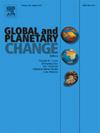Reconciling inconsistent trends of geochemical and environmental magnetic records from East Asian sediments based on modern calibration
IF 4
1区 地球科学
Q1 GEOGRAPHY, PHYSICAL
引用次数: 0
Abstract
An accurate understanding of the effects of temperature/precipitation variations on geochemical and magnetic indicators within soils is fundamental to reconstructing the evolution of the Asian monsoon. Here, we investigate correlations between temperature/precipitation and geochemical/magnetic parameters in a Qilian Shan elevation transect. Our results suggest that the geochemical indicators of chemical weathering intensity are dominantly controlled by precipitation at low altitudes, but, at higher altitudes, temperature replaces precipitation as the primary controlling factor. In contrast, magnetic indicators consistently reflect precipitation influences across elevations. We explore this framework to address contradictions between magnetic and geochemical records from the Chinese Loess Plateau, proposing that late Neogene geochemical variations may reflect temperature shifts during global cooling, while magnetic changes align with precipitation, modulated by CO2 and tectonic paleogeography. We advocate for an integrated approach to reconstructing terrestrial temperature and precipitation histories.
基于现代定标的东亚沉积物地球化学和环境磁记录不一致趋势的调和
准确理解温度/降水变化对土壤地球化学和磁性指标的影响是重建亚洲季风演变的基础。本文研究了祁连山高程样带温度/降水与地球化学/磁场参数的相关性。研究结果表明,化学风化强度的地球化学指标在低海拔地区主要受降水控制,而在高海拔地区,温度取代降水成为主要控制因素。相反,磁指标一致地反映了不同海拔的降水影响。为了解决中国黄土高原地磁记录与地球化学记录之间的矛盾,我们提出晚新近纪地球化学变化可能反映了全球变冷期间的温度变化,而地磁变化与降水一致,受CO2和构造古地理的调节。我们提倡采用综合方法重建陆地温度和降水历史。
本文章由计算机程序翻译,如有差异,请以英文原文为准。
求助全文
约1分钟内获得全文
求助全文
来源期刊

Global and Planetary Change
地学天文-地球科学综合
CiteScore
7.40
自引率
10.30%
发文量
226
审稿时长
63 days
期刊介绍:
The objective of the journal Global and Planetary Change is to provide a multi-disciplinary overview of the processes taking place in the Earth System and involved in planetary change over time. The journal focuses on records of the past and current state of the earth system, and future scenarios , and their link to global environmental change. Regional or process-oriented studies are welcome if they discuss global implications. Topics include, but are not limited to, changes in the dynamics and composition of the atmosphere, oceans and cryosphere, as well as climate change, sea level variation, observations/modelling of Earth processes from deep to (near-)surface and their coupling, global ecology, biogeography and the resilience/thresholds in ecosystems.
Key criteria for the consideration of manuscripts are (a) the relevance for the global scientific community and/or (b) the wider implications for global scale problems, preferably combined with (c) having a significance beyond a single discipline. A clear focus on key processes associated with planetary scale change is strongly encouraged.
Manuscripts can be submitted as either research contributions or as a review article. Every effort should be made towards the presentation of research outcomes in an understandable way for a broad readership.
 求助内容:
求助内容: 应助结果提醒方式:
应助结果提醒方式:


